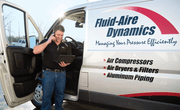Can coronavirus infiltrate your compressed air system?
What about other kinds of microbes? And what can you do to protect yourself from microbial contamination in your compressed air system?
The rapid spread of COVID-19 has raised new concerns about the ability of viruses and other microbes to live in and be spread by compressed air systems. The fast answer for coronavirus is no; you probably don’t need to worry about coronavirus specifically. Viruses are generally too fragile to survive for long in your air compressor or piping. But there are other microbes you may want to be concerned about, such as bacteria and fungi. This Q&A will answer your top questions about microbial contamination in compressed air.
Special thanks to our friends at Trace Analytics, LLC, for their help with this content and for the great photos from the laboratory.
What kinds of microbes can live in my compressed air system?
Many kinds of microorganisms can live in compressed air systems, including bacteria, mold and yeast. These organisms thrive in damp, dark places (such as your air compressor coils or compressed air piping), and they can grow anywhere where there are suitable conditions.
Viruses, on the other hand, are less likely to be found thriving in a compressed air system. While viruses are of a concern to public health, they are not viable organisms by themselves—they require a host to replicate. In some cases, that host could be a bacteria or other microorganism. That means it is theoretically possible to have viral contamination in your compressed air system if the system is contaminated by certain bacteria or fungi. However, coronaviruses, like most viruses, need other kinds of hosts to survive.
Can coronavirus be spread by my compressed air system?
The simple answer is no—the coronavirus that causes COVID-19 cannot replicate independently in your compressed air system. As explained above, viruses require the right host to live. Viruses that may be able to find a foothold in your compressed air system include viruses that infect bacteria (bacteriophages) and those that infect fungi (mycoviruses). Coronaviruses are not in either category; they must have a human or susceptible animal host to replicate.
While the coronavirus that causes COVID-19 has been shown to live up to 72 hours on hard surfaces under some conditions, based on what we know, it seems unlikely that coronavirus is a concern in compressed air systems. At this time, no studies have been published implicating industrial or medical compressed air in contributing to the spread of coronavirus or other viruses causing disease.
What are the risks related to viable microbial contamination in compressed air systems?
The risks of microbial contamination are directly related to the application in which the air will be used. For most manufacturing applications, risks are fairly small: manufactured parts are not directly damaged by microbes, and microorganisms are unlikely to survive further manufacturing processes (especially those involving heat or chemicals). However, compressed air microbial contamination is a much bigger concern for the food, pharmaceutical and medical industries. Ambient air contamination may also be a concern in certain cleanroom facilities.
- If microorganisms are growing in a compressed air system that is used in direct or indirect contact with food products, then the microbes can cause spoilage or disease. Bacteria like Salmonella, Shigella, E. coli, and Coliforms are all of particular concern to food manufacturers.
Salmonella and Coli Bacteria
If the air is used for breathing, mold and bacteria can both be a concern. Mold or bacteria can negatively impact the health of the individual breathing it.
Mold
Some molds and bacteria produce non-viable products called secondary metabolites. While some of these are beneficial (like penicillin), others (such as endotoxins produced by Gram-negative bacteria) can cause illness or even death.
What environmental factors enable microbes to grow and spread in compressed air systems?
Warm, damp environments are particularly suitable for microbial growth. If the compressed air system is contaminated with water, oil or particulates, microorganisms such as bacteria, yeast and fungi are more likely to grow. Dead-end runs or drains are the most common places for microbial growth within the compressed air system. Microbial contamination can also be found in compressed air coils, filters and in compressed air lines and piping, especially if the air running through the lines is damp.
Leaks in your compressed air system can allow water, oil or microorganisms to enter the system, collect and grow. Environmental conditions, such as seasonal changes or increases in humidity, can also contribute to the growth of microorganisms.
How do I know if there are microorganisms in my compressed air system?
Testing is available for bacteria, molds and yeasts—particularly those of concern for human health and safety. To test for microbial contamination in the compressed air system, the air is sampled onto a gelatinous nutrient surface, given ideal conditions to grow and then analyzed. At this time, there is no standardized testing available to test for viral contamination.
Fluid-Aire Dynamics uses Trace Analytics, LLC, an ISO 17025 accredited laboratory that specializes in compressed air and gas testing. They offer an impaction sampler that can be used to test for bacteria, yeast and mold. Presumptive identification is available to test for bacteria such as Listeria, Salmonella, Shigella, E. coli, Coliforms and for Candida, a yeast.
How “clean” (microbe-free) is clean enough for my compressed air system?
Each facility must perform a risk assessment to determine their own limits. Many manufacturers use ISO 8573 for compressed air testing, but this standard has not yet set acceptable limits for microorganism contamination. Food, pharmaceutical and medical applications require much tighter tolerances for microbial contamination than manufacturing applications.
How can I reduce the growth of microorganisms in my compressed air system?
Reducing water, oil and particulates in your compressed air system will also reduce the ability of microbes to live and reproduce. Maintaining a dry, clean system will go a long way towards reducing the risk of microbial contamination in compressed air. Here are some specific steps you can take:
- Fix compressed air leaks that enable moisture, oil and particulates to enter and circulate through the system. Fixing leaks will also improve the energy efficiency of your system. (You may even be able to get air leaks fixed for free through incentives from your energy company!)
- Install an air dryer and make sure it is working properly to reduce moisture in compressed air delivery lines and piping systems. Refrigerated air dryers are adequate for most general applications, but if you are highly concerned about microbial growth you may want to opt for a desiccant air dryer. These dryers, while more expensive, produce super-dry air that may more effectively inhibit microbial growth.
- Ensure that compressed air filtration is adequate and appropriately maintained. Filters can provide a hospitable environment for many types of microbes, especially if the filter medium is damp. Change filters on a regular basis to reduce microbial growth and contamination of downstream compressed air lines and components. Be sure the filter pore size is adequate for your target contaminant.
- If microbial contamination is a particular concern for your application, you should have your compressed air system tested regularly. Regular compressed air testing will provide peace of mind and identify any emerging problems so they can be quickly mitigated.
Aire Tip: If you are highly concerned about microbial growth, you may want to opt for a desiccant air dryer. These dryers produce super-dry air that effectively inhibits microbial growth.
Fluid-Aire Dynamics can help you evaluate your system and identify leaks or other problems that may lead to excessive microbial growth in your compressed air system. We can also perform system upgrades, such as installing a desiccant air dryer, that will make your system less hospitable for invading microbes. Trace Analytics performs microbial testing for compressed air systems.
Concerned about microbial growth in your compressed air system? Contact us for an evaluation.




